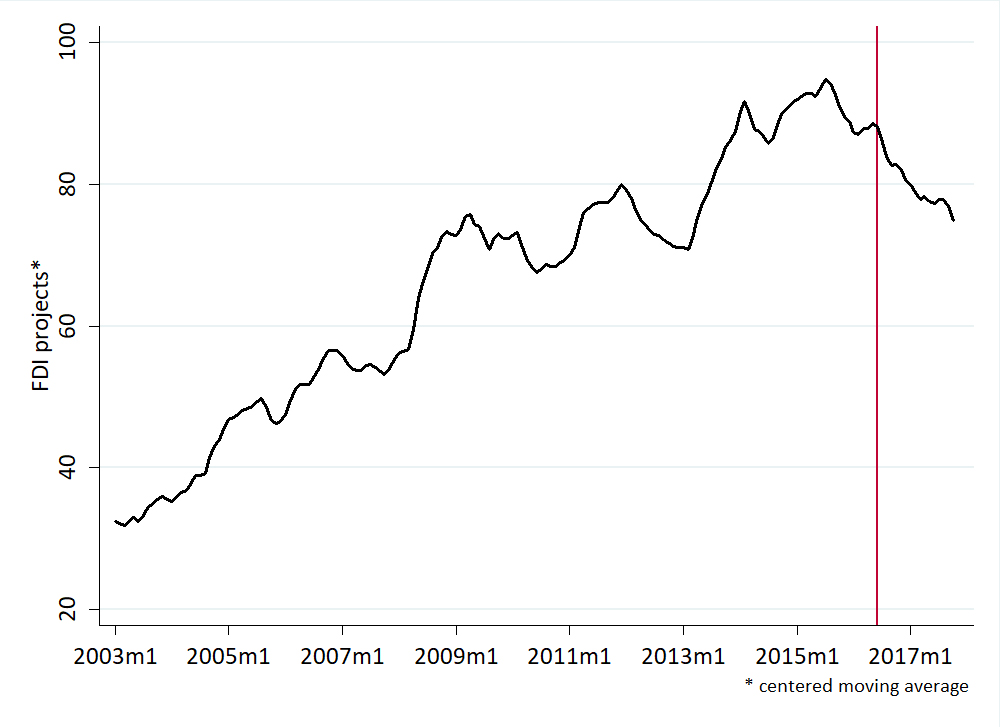
 31 October 2018
31 October 2018
Ilona Serwicka, Research Fellow in the economics of Brexit at the UKTPO and Nicolo Tamberi, Research Assistant in Economics for the Observatory.
Our latest research finds that overseas investment to the UK may be some 19 per cent lower because of the vote to leave the EU. Despite a buoyant 12 months for the world economy in 2017, inflows of Foreign Direct Investment (FDI) to the UK have continued to decline since reaching a peak in 2015.
For the UK, it is the longest continuous decline in FDI since records began, with the 10 per cent reduction in the number of projects and £1.5 billion reduction in the value of capital investment between 2016 and 2017.

Dr Ilona Serwicka, UKTPO Research Fellow in the Economics of Brexit at the University of Sussex and co-author of the Briefing Paper, Not Backing Britain: FDI Inflows Since the Brexit Referendum said:
“Our research has shown that there has been a considerable drop in FDI since the vote to leave the EU and if the trend is not reversed, there could be serious damage to the UK economy in the medium-long run. This fall in FDI could be due to a temporary adjustment because of the current climate of uncertainty. But it could also indicate a permanent shift away from the UK by foreign investors.”
The UK remains one of the largest recipients of FDI in the world, with almost 1,000 greenfield investment projects in 2017 totalling more than US$33 billion and creating approximately 60,000 new jobs.
But the uncertainty over the UK’s future caused by the EU Referendum result has seen the country lose its status as the largest recipient of greenfield FDI in Europe. In 2017, the UK was overtaken by Germany as the largest European recipient of FDI with France also gaining ground.
In early 2015, a quarter of all FDI projects into the EU28 were destined for the UK. By late 2017, this proportion had fallen to 18 per cent.
In the services sector, which accounts for around three-quarters of the UK economy, the loss of investment is estimated to be as high as 25 per cent. Sectors hit hardest include high-value-added industries such as software publishing, investment management and retail banking with the post-Brexit reduction in FDI putting high-skilled jobs at risk.
Nicolo Tamberi, Research Officer in the Economics of Brexit at the University of Sussex, said:
“The UK is attractive for FDI for a number of reasons, including the UK’s status as a member of the EU that offers businesses investing here easy access to the European Single Market. But the drop in FDI that we observe suggests that the prospect of losing unfettered access to the EU Single Market once the UK leaves the EU could lower investors’ appetite to invest in the UK.”
Over 12,000 inward investment projects to the UK worth were recorded between 2003 and 2017 with 8,000 different companies investing a total US$540 billion and creating almost 900,000 jobs. This figure includes all project-based ‘productive’ investment that resulted in new capacity, but excludes mergers and acquisitions.
The researchers computed the size of FDI inflows for a “synthetic UK”, a weighted average of other similar countries (a control group), which is taken to tell us what would have happened to the UK in the absence of Brexit.
This was done by analysing a set of FDI determinants (such as GDP, population, trade openness, market potential, corporate tax rate, employment share and employment share in the services industry, cost of labour, education level) to derive a series of weights for each country in the control group in the pre-Brexit period. Assuming that these weights remained unchanged in the post-Brexit period, inflows of FDI to the “synthetic UK” were calculated.
Read the full Briefing Paper 23, Not Backing Britain: FDI Inflows Since the Brexit Referendum
I’m sure Brexit has had a significant impact, but how sure are you in causally linking it to the fall in FDI flows? I ask this mostly because the UNCTAD WIR 2018 suggests that the UK FDI fall is mostly due to the absence of mega deals between US and UK companies that we’ve seen in recent years. These mega deals seem to have a large, often distorting effect on the aggregate FDI figure. Interested to hear your thoughts.
Mega deals should not affect our analysis for two reasons. We look at the number of investment projects rather than value of investment. In this context, a mega deal would still count as a single project, no matter how large it is, and would not distort the aggregate figure.
Why is it presumed that FDI is always beneficial, and that the higher the better? To what do you attribute previous falls, in 2012, for example?
The figure of a 92% drop since the ref is often used. Can you comment on this.
https://inews.co.uk/news/uk/foreign-investment-in-the-uk-has-fallen-92-since-2016-why/
Jason, I suggest you read the reference you cite:
“The 2016 UK figure is much, much higher than it would usually be because of a huge merger of two of the world’s biggest alcohol companies, and as one of the companies is headquartered in London (despite selling globally) that figure counted as FDI, meaning the UK figure was hugely inflated versus its usual level.”
The authors therefore attribute much of the fall to an abnormally large single FDI event shortly before the referendum, and, contrary to the implication of your post, do NOT say that the Brexit vote caused a 92% fall.
They do however point to the 2017 level being only one third of the average for the 2011-2016 period, despite the first part of this period coinciding with part of the Great Recession.